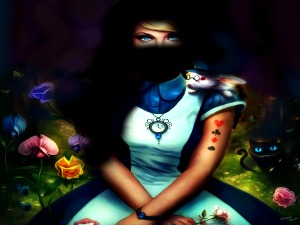On February 26th, MPAC announced a partnership with Disney/ABC Television Group to offer a one-day workshop to identify and empower American Muslims interested in pursuing a career in screenwriting for television. The announcement came just days after the release of Salaam, Love and the conclusion of Columbia University’s symposium The Muslim Protagonist: a synthesis of journeys. It was heartening to see momentum growing around nurturing and empowering American Muslims who aspired to be writers and storytellers.
It seems ABC decided that was too long to wait to have a “Muslim narrative” on television written by a Muslim writer, however. On March 17th, ABC Family announced it was adding three new drama pilots to its programming, one of which was titled Alice in Arabia. The show was written by a novice TV writer, Brooke Eikmeier, who according to Deadline, wrote the script while serving in the US Army at Fort Carson, Colorado, as a cryptologic linguist specializing in Arabic and remotely supporting NSA missions in the Middle East.
The following is a synopsis of the show:
“Alice in Arabia is a high-stakes drama series about a rebellious American teenage girl who, after tragedy befalls her parents, is unknowingly kidnapped by her extended family, who are Saudi Arabian. Alice finds herself a stranger in a new world but is intrigued by its offerings and people, whom she finds surprisingly diverse in their views on the world and her situation. Now a virtual prisoner in her grandfather’s royal compound, Alice must count on her independent spirit and wit to find a way to return home while surviving life behind the veil.”
Kate Juergens, Chief Creative Officer and EVP Original Content, described the show as being “fitting with ABC Family’s brand.”
A show written by a White woman who isn’t Muslim and who served in the US Army while assisting the NSA in surveillance (but who did not, as far as we know, ever go to Saudi Arabia or the Middle East) portraying a Muslim woman-of-color was supposed to be “innovative and authentic”.
ABC released this statement as a response to various criticisms about its new purchase, “We hope people will wait to judge this show on its actual merits once it is filmed. The writer is an incredible storyteller and we expect Alice to be a nuanced and character driven show.” Buzzfeed received a copy of the pilot’s script, and it confirmed the fears and criticisms raised about the show.
The name of the show is clearly adapted from Lewis Carroll’s Alice in Wonderland, implying that Alice has been sucked down the rabbit hole into a non-sensical and nightmarish world, in this case, Saudi Arabia. The show not only hijacks minority voices, thereby reinforcing White privilege (which ABC never acknowledges), but also perpetuates Orientalism, dangerous gender stereotypes of Muslim men and women, racism, xenophobia, and Islamophobia — Muslim women are all forced to wear hijab, Arab women are oppressed, Arab/Muslim men are a danger to females and they kidnap and keep children captive, Saudi Arabia is an intriguing and exotic place, the surprising notion that Arabs/Muslims are not a monolith, and the list goes on.
From the description, one can deduce that Alice is the granddaughter of a man in the royal family, making her a princess. In the script, Alice’s grandfather introduces himself as a Prince from the House of Saud, Saudi Arabia’s ruling family. This means she would be living in the upper echelons of political power and socioeconomic class. Perhaps as an ‘enlightened American’ finding herself in a very strategic position, she could save the ‘barbaric Muslims/Arabs’ from themselves! Such a dichotomy is clearly established in the show, as various characters comment that one cannot truly be “American” and “Muslim”.
What stories are told, particularly on a national stage, and who is telling those stories matters. In the case of Alice in Arabia, it means that Muslims from both the United States and from Saudi Arabia are stripped of their agency. As Rabia Chaudry states, “it reaffirms the fact that overwhelmingly the stories in the West of Muslims and Arabs are not actually being told by Muslims and Arabs.”
Stories shape our perceptions and beliefs about the world around us and the people within it. Such stories with harmful stereotypes of Muslims “leav[e] a mark on the American psyche”: in 2010, the FBI reported a 50% rise in hate crimes against perceived Muslims as a result of Islamophobic propaganda (and these numbers are underreported); and in 2013, the Arab-American Anti-Discrimination Committee reported staggering rates of discrimination and attacks after 9/11 against those who identify as Arab, Afghani, or Middle Eastern, and Muslim.
What happens when Muslims write their own stories? You see superheroines like the Burka Avenger and Ms. Marvel – empowered Muslim women. You see nuanced essay collections like Love, Inshallah and Salaam, Love. Investing in Muslim writers is not only the right thing to do, but it’s also the smart thing to do. For those interested in opportunities that aim to increase diversity in television and film, check out this recent Twitter-sourcing by author Saladin Ahmed.
Such a show being bought, even for just a pilot, seems like a step backwards when there has been all this progress. The good news is that this problematic storyline will not be airing on television. Faced with enormous pressure from the online Muslim community and civil rights groups like the American-Arab Anti-Discrimination Committee and the Council on American-Islamic Relations, ABC/Disney decided on March 21st to cancel the show.
Photo Credit: Chicago Monitor
Firdaus Arastu is an Assistant Editor at altMuslimah.




